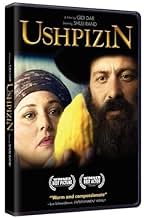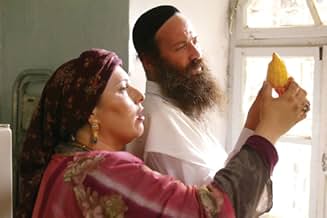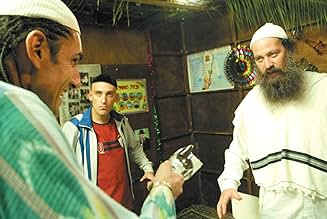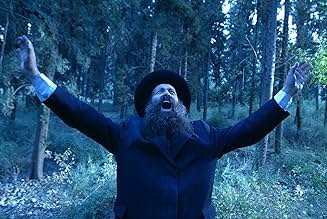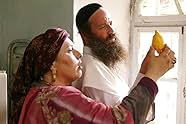IMDb-BEWERTUNG
7,3/10
2172
IHRE BEWERTUNG
Füge eine Handlung in deiner Sprache hinzuAn Orthodox Jewish couple's faith is tested after praying to the Lord for a child on the Succoth holiday.An Orthodox Jewish couple's faith is tested after praying to the Lord for a child on the Succoth holiday.An Orthodox Jewish couple's faith is tested after praying to the Lord for a child on the Succoth holiday.
- Auszeichnungen
- 1 Gewinn & 4 Nominierungen insgesamt
Daniel Dayan
- The Rabbi
- (as Rabbi Daniel Dayan)
Michael Weigel
- Ethrog Assessor
- (as Michael Vaigel)
Empfohlene Bewertungen
"Sad to be all alone in the world" WIthout children there is no laughter.... so starts the struggle of a Baal Tshuvah (returnees to Judaisn) family in Israel in the huge Breslower chassidic community. Moshe Balanga is struggling to put food on the table, although it is never explained WHY he doesn't work, he comes home dejected on the eve of the holiday of Sucot only to be told by his wife that his faith is lacking and that he should pray harder. Ushpizen is a look at the guarded frum (religious) community from the inside. No compromises of nudity, sex, violence, foul language are needed to tell this sweet, fast paced, emotional story. I saw it with a mostly Jewish audience, but sat next to a non jew who enjoyed it as much as I did. For all ages, for all walks of life.... You will cry, and you will laugh, and you will cheer when it is over. I can't wait to see it again, I suggest you run to see it when it hits national release in September.
Israeli cinema continues to surprise us. Not knowing anything about what this film was about, we went on the strength of the trailers we had watched. Giddi Dar, the director of "Ushpizin", is a secular man who has created a wonderful movie of hope and faith, based on the screen play by its star, Shuli Rand.
This story might be set in Israel, but it will probably resonate in audiences that go to see it with an open mind because it can be translated to other cultures. "Ushpizin" presents us an Orthodox Jewish couple that can hardly make ends meet. A religious feast is dawning on Moshe and Malli and they don't have enough to eat themselves, expecting somehow in a miracle to solve their situation. Moshe is a man that had a dubious past and has decided to become religious as a way to atone. Malli hasn't been able to conceive, a thorn in their hearts because both want a baby desperately.
When a mysterious envelope is slid under their door, Malli is shocked to find a thousand dollars in it. That seems to be the solution to their monetary problems. At the same time, we have witnessed a distraught Moshe praying for a miracle. The couple is not prepared for the unexpected riches they get, the only thing is they don't have anyone to invite to partake of the feast Malli has prepared.
Moshe's problems start just as the couple is going to begin eating, two strange men appear at their door. They are Eliyaher and Yossef, two convicts that knew Moshe in his prior life. The Bellangas believe this is another miracle because the best way to celebrate the feast is to have guests to share it with. Moshe and Malli are in for a rude awakening.
The film works because of the fine work of all the principals who play their roles convincingly. Shuli Rand is excellent. Michal Rand, makes the long suffering Malli a woman the viewer can identify with.
The film is almost a fable with a marvelous ending that will bring smiles to the viewer. Giddi Gar, the director, has to be congratulated for making this such a personal and, at the same time, universal story, come true for everyone's delight.
This story might be set in Israel, but it will probably resonate in audiences that go to see it with an open mind because it can be translated to other cultures. "Ushpizin" presents us an Orthodox Jewish couple that can hardly make ends meet. A religious feast is dawning on Moshe and Malli and they don't have enough to eat themselves, expecting somehow in a miracle to solve their situation. Moshe is a man that had a dubious past and has decided to become religious as a way to atone. Malli hasn't been able to conceive, a thorn in their hearts because both want a baby desperately.
When a mysterious envelope is slid under their door, Malli is shocked to find a thousand dollars in it. That seems to be the solution to their monetary problems. At the same time, we have witnessed a distraught Moshe praying for a miracle. The couple is not prepared for the unexpected riches they get, the only thing is they don't have anyone to invite to partake of the feast Malli has prepared.
Moshe's problems start just as the couple is going to begin eating, two strange men appear at their door. They are Eliyaher and Yossef, two convicts that knew Moshe in his prior life. The Bellangas believe this is another miracle because the best way to celebrate the feast is to have guests to share it with. Moshe and Malli are in for a rude awakening.
The film works because of the fine work of all the principals who play their roles convincingly. Shuli Rand is excellent. Michal Rand, makes the long suffering Malli a woman the viewer can identify with.
The film is almost a fable with a marvelous ending that will bring smiles to the viewer. Giddi Gar, the director, has to be congratulated for making this such a personal and, at the same time, universal story, come true for everyone's delight.
Positive depictions of haredi (so-called-ultra-Orthodox) lifestyle in film, whether American or Israeli, are not common. "Ushpizin" is a delightful little tale, almost a fable, with quite a bit of hidden depth.
Newly religious Moshe and Mali (real-life couple Shuli and Michal Bat-Sheva Rand) desperately need a miracle to get through the holiday of Sukkot. Without any support from Moshe's yeshiva, they are about to be overwhelmed by back rent and other debts. Strict believers in the Breslov tradition, they pray for a miracle, even as it unfolds (a brilliant 3-way inter-cut sequence that is the highlight of the film). Their joy is short-lived, however, when Elihayu and Yosef, unexpected guests from Moshe's pre-Haredi life, join them for the holiday.
The film is surprisingly honest -- Moshe and Mali are placed in the uncomfortable position of practicing genuine hospitality and tolerance to those who attitudes and actions place them diametrically opposed to everything the haredi couple stand for. Indeed, when Eliyahu and Yosef blast their music in the middle of the haredi neighborhood, a lynch mob nearly forms, the isolationist side of Haredi life raising its ugly head to keep its own courtyards clean of the outside world. There is a certain sense in the movie that Breslov chasidim distinguish themselves from the other sects in truly practicing love and outreach, coupled with unshakable belief.
Shuli Rand's portrayal of Moshe, which is probably more than a bit autobiographical, is dead-on: conflicted and uncomfortably reminded of a world he left far behind. The film makes a strong case for Divine Providence in every aspect of every individual's life, and for living up to the challenges and tests that G-d places before you.
Newly religious Moshe and Mali (real-life couple Shuli and Michal Bat-Sheva Rand) desperately need a miracle to get through the holiday of Sukkot. Without any support from Moshe's yeshiva, they are about to be overwhelmed by back rent and other debts. Strict believers in the Breslov tradition, they pray for a miracle, even as it unfolds (a brilliant 3-way inter-cut sequence that is the highlight of the film). Their joy is short-lived, however, when Elihayu and Yosef, unexpected guests from Moshe's pre-Haredi life, join them for the holiday.
The film is surprisingly honest -- Moshe and Mali are placed in the uncomfortable position of practicing genuine hospitality and tolerance to those who attitudes and actions place them diametrically opposed to everything the haredi couple stand for. Indeed, when Eliyahu and Yosef blast their music in the middle of the haredi neighborhood, a lynch mob nearly forms, the isolationist side of Haredi life raising its ugly head to keep its own courtyards clean of the outside world. There is a certain sense in the movie that Breslov chasidim distinguish themselves from the other sects in truly practicing love and outreach, coupled with unshakable belief.
Shuli Rand's portrayal of Moshe, which is probably more than a bit autobiographical, is dead-on: conflicted and uncomfortably reminded of a world he left far behind. The film makes a strong case for Divine Providence in every aspect of every individual's life, and for living up to the challenges and tests that G-d places before you.
This was a delightful movie in so many ways.
First, I really enjoyed the overall depiction of what was for me a very different cultural setting ... both regarding the religious context (Ultra-Orthodox Judaism) and the geocultural context (contemporary Israel, especially contemporary Jerusalem). I certainly can't comment on authenticity; but the overall flavor was convincing and the often exotic (to me) happenings, sayings, behaviors, etc were to me very appealing.
Second, the characters of Moshe and Malli were simply wonderful and wonderfully appealing. Their relationship was vivid; and the window into how an Orthodox marriage relationship "works" in the context of a strong Faith commitment by both of the couple was such a bracing experience for me.
Third, the general plot-theme ... two escaped convicts showing up and both challenging and straining Hospitality ... is very appealing to me. The characters of the convicts ... Scorpio and Yossef ... were much less appealing but certainly (uh) interesting.
Still the odd relationship between Moshe and Scorpio; and between Moshe and his wife and Scorpio and Yossef ... somehow lacked something that for me I could really find very convincing. The behavior of Scorpio and Yossef toward both their hosts, and to the general religious community on the street in which they were staying, was so attention-provoking that I had to ask myself what kind of escaped convicts want that kind of attention.
Yet all in all I really enjoyed this movie. And if you, like me, find this a pleasing but somewhat mystifying *cultural* challenge, hey, read some of the other comments on IMDb, there are some wonderful comments from Israel in particular that have shed much light for me.
First, I really enjoyed the overall depiction of what was for me a very different cultural setting ... both regarding the religious context (Ultra-Orthodox Judaism) and the geocultural context (contemporary Israel, especially contemporary Jerusalem). I certainly can't comment on authenticity; but the overall flavor was convincing and the often exotic (to me) happenings, sayings, behaviors, etc were to me very appealing.
Second, the characters of Moshe and Malli were simply wonderful and wonderfully appealing. Their relationship was vivid; and the window into how an Orthodox marriage relationship "works" in the context of a strong Faith commitment by both of the couple was such a bracing experience for me.
Third, the general plot-theme ... two escaped convicts showing up and both challenging and straining Hospitality ... is very appealing to me. The characters of the convicts ... Scorpio and Yossef ... were much less appealing but certainly (uh) interesting.
Still the odd relationship between Moshe and Scorpio; and between Moshe and his wife and Scorpio and Yossef ... somehow lacked something that for me I could really find very convincing. The behavior of Scorpio and Yossef toward both their hosts, and to the general religious community on the street in which they were staying, was so attention-provoking that I had to ask myself what kind of escaped convicts want that kind of attention.
Yet all in all I really enjoyed this movie. And if you, like me, find this a pleasing but somewhat mystifying *cultural* challenge, hey, read some of the other comments on IMDb, there are some wonderful comments from Israel in particular that have shed much light for me.
It's quite hard for me to speak about this film without referring to the context of the delicate balance of relations between religious and non-religious people in Israel. This film is made mostly by religious people, and the whole story is told from the perspective of the deep believers. Jewish religious Jerusalem looks beautiful in this film, and it's no better moment to put it on screen than the festival of Succot. Still, the world and life of the religious people in Israel is much more complicated, and the problems they face are quite different, but this is not what this story is about.
What this is indeed about is about what does influence our lives. The main characters are a born-again Jew and his wife, living at the brink of their resources a life of devotion and religious studies. Many things happen to them in the few days before and during the holiday, and these can be explained as miracles dictated by God, or by circumstances of hazard. Of course, the characters are true believers, they speak to God, and know that God rewards them or punishes them for their deeds, but is not this the result of their imagination derived from their deep belief? The director makes for most of the film no comment and lets the viewers decide by themselves. Only by the end, in the last minutes he decides to become explicit, and this is a mistake in my opinion. The kind of Hollywood style ending adopted by this film is sometimes called 'Deus ex machina' and never was the name more appropriate.
Acting is wonderful, both of the religious people looking like characters descending directly from Bashevis Singer's books, as well as the non-religious ones, although their characters are closer to stereotypes. The film was originally made for TV, I believe, with a small budget, it still is true and sincere and funny in many moments. I am looking forward to see how it will be received by the North American audiences.
What this is indeed about is about what does influence our lives. The main characters are a born-again Jew and his wife, living at the brink of their resources a life of devotion and religious studies. Many things happen to them in the few days before and during the holiday, and these can be explained as miracles dictated by God, or by circumstances of hazard. Of course, the characters are true believers, they speak to God, and know that God rewards them or punishes them for their deeds, but is not this the result of their imagination derived from their deep belief? The director makes for most of the film no comment and lets the viewers decide by themselves. Only by the end, in the last minutes he decides to become explicit, and this is a mistake in my opinion. The kind of Hollywood style ending adopted by this film is sometimes called 'Deus ex machina' and never was the name more appropriate.
Acting is wonderful, both of the religious people looking like characters descending directly from Bashevis Singer's books, as well as the non-religious ones, although their characters are closer to stereotypes. The film was originally made for TV, I believe, with a small budget, it still is true and sincere and funny in many moments. I am looking forward to see how it will be received by the North American audiences.
Wusstest du schon
- WissenswertesShuli Rand had two conditions for making this movie, both were met. The first was that his real-life wife, Michal Bat-Sheva Rand, would play his wife in the film. The second is that in Israel the film would not be screened on the Jewish Sabbath.
- Zitate
[from trailer]
Narrator: They worked out of luck, out of hope. And faith was all they had to hang on to. But on this holy week, where guests are considered a blessing, these two unexpected visitors bring with them: a secret from the past. A secret that would test their love and challenge their faith. Now only a miracle will turn their fortune around.
- VerbindungenFeatured in Sharon Amrani: Remember His Name (2010)
Top-Auswahl
Melde dich zum Bewerten an und greife auf die Watchlist für personalisierte Empfehlungen zu.
Details
Box Office
- Bruttoertrag in den USA und Kanada
- 1.400.666 $
- Eröffnungswochenende in den USA und in Kanada
- 64.423 $
- 23. Okt. 2005
- Weltweiter Bruttoertrag
- 1.565.016 $
Zu dieser Seite beitragen
Bearbeitung vorschlagen oder fehlenden Inhalt hinzufügen






